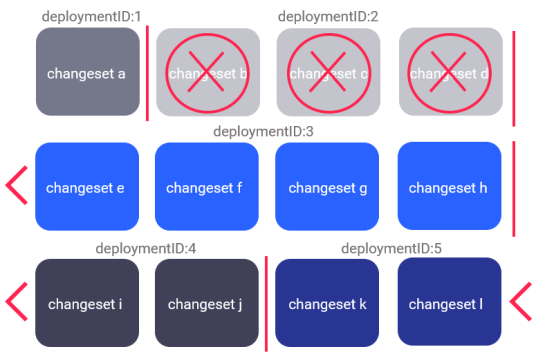Maven rollbackOneUpdate
Last updated: September 2, 2025
The Maven rollbackOneUpdate goal rolls back all changesets related to a specific deploymentId that was made during a specific change to your database.
Note: This is a Liquibase Pro goal, so you need a Liquibase Pro License Key to use it.
Uses
The Maven rollbackOneUpdate goal is typically used when you want to undo a series of changes made to your database during a specific deployment and revert those changesets to their previous state without affecting any other changes made to your database.
The rollbackOneUpdate goal allows you to target a specific deploymentId without impacting other changes or deployments that came before or after it.

The image shows deploymentIds 1 through 5, with deploymentId 2 incorporating all the changesets to roll back. As you can see, the rollbackOneUpdate goal allows you to target deploymentId 2 and revert all changesets associated with the same deploymentId to its previous state without impacting the others.
The impacts of rollbackOneUpdate
Using the rollbackOneUpdate goal comes with risks of unintended consequences. For this reason, it is best practice to run the Maven rollbackOneUpdateSQL goal because it allows you to inspect the rollback SQL and search for any potential mistakes before you execute rollbackOneUpdate.
Also, as the use of rollbackOneUpdate comes with risks of unintended consequences, the goal requires a liquibase.force attribute to specify that you intend to run the goal.
Additional impacts to the DATABASECHANGELOG table
Running the rollbackOneUpdate goal will remove the deployment record from the DATABASECHANGELOG table. For this reason, you must decide on what to do with your changesets after the rollbackOneUpdate goal has been run.
Depending on your desired outcome, consider doing one of the following:
Modify the changeset in the changelog file and re-deploy it.
Do nothing to the changeset in the changelog file and have it be re-deployed.
Delete the changeset in the changelog file.
Maven configuration
You can configure Liquibase Maven in multiple ways. You can pass arguments like <changeLogFile> in Maven directly in your pom.xml file, in a liquibase.properties file referenced in your POM, as environment variables, or as JVM system properties. To learn about each file's syntax, see Maven Properties.
For more information about the Maven configuration, see Configuring Maven.
Ensure you add <ProLicenseKey>specify your Liquibase Pro license key here</ProLicenseKey> to pom.xml or specify it in another valid way.
Running the rollbackOneUpdate Maven goal
Before running the rollbackOneUpdate goal, you can get the deploymentId of the deployment you want to revert by running the Maven history goal: mvn liquibase:history
Note: If you don't specify the deploymentId, by default, Liquibase Pro will look up the most recent deploymentId from the DATABASECHANGELOG table and use it for the rollback.
Next, run the rollbackOneUpdate goal, with your information:
mvn liquibase:rollbackOneUpdate -Dliquibase.deploymentId=6477021518
Note: Enter the name of the deploymentId that you want to use in place of 6477021518. For more information, run mvn liquibase:help -Ddetail=true -Dgoal=rollbackOneUpdate.
Maven rollbackOneUpdate
Required Maven rollbackOneUpdate configuration attributes
Definition | |
|---|---|
| Specifies the update you want to roll back. A list of updates with changesets grouped by their |
| Specifies a required flag that indicates you intend to run this command. |
| Specifies your Liquibase Secure license key. |
Maven rollbackOneUpdate output
Starting Liquibase at 08:06:54 (version 4.1.1 #10 built at 2020-10-12 19:24+0000)
[INFO] Parsing Liquibase Properties File local.liquibase.properties for changeLog parameters
[INFO] Executing on Database: jdbc:oracle:thin:@localhost:1521/ORCL
[INFO] Successfully installed license from Base64 string starting with 'ABwwGgQUvH' (property liquibaseProLicenseKey).
[INFO] Liquibase Pro 4.1.1 by Liquibase licensed to support until Wed Sep 22 23:59:59 CDT 2021
[INFO] Liquibase Pro 4.1.1 by Liquibase licensed to support until Wed Sep 22 23:59:59 CDT 2021
[INFO] Reading from DATABASECHANGELOG
[INFO] Successfully acquired change log lock
Rolling Back Changeset:dbchangelog.xml::1606322157619-17::Nataliya (generated)
Rolling Back Changeset:dbchangelog.xml::1606322157619-16::Nataliya (generated)
[INFO] Successfully released change log lock
[INFO] ------------------------------------------------------------------------
[INFO]
[INFO] ------------------------------------------------------------------------
[INFO] BUILD SUCCESS
[INFO] ------------------------------------------------------------------------
[INFO] Total time: 5.202 s
[INFO] Finished at: 2020-11-27T08:06:56-06:00
[INFO] ------------------------------------------------------------------------